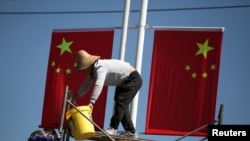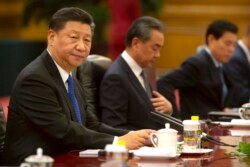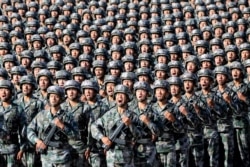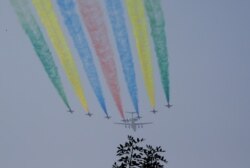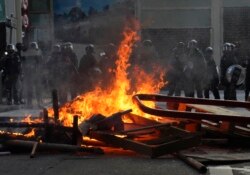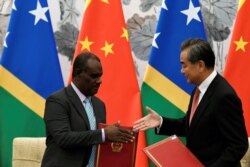China is planning extravagant celebrations including an unprecedented military parade to mark the 70th anniversary of its founding on October 1.
While state media herald the possible debut of advanced home-grown weapons as a show of force on the upcoming National Day, analysts warn that the incumbent administration under the leadership of President Xi Jinping is facing challenges ahead amid growing domestic discontent, trade frictions with the United States and political unrest in Hong Kong.
Of all events, the military parade of the largest-ever scale will send a resounding political message, said Willy Lam, a noted Chinese political analyst.
Ruling legitimacy
“This is very important for the legitimacy of the party, which doesn’t of course have ballot-box legitimacy,” Lam said.
“By showing that China is now almost a super power…, Xi Jinping is telling every Chinese that they should be proud of China’s achievement and they should not be asking the party for western values and norms such as freedom of expression, rule of law and so forth,” he added.
In other words, Xi wants every Chinese to continue to follow his party’s rule and honor him as the party’s eternal core, the Hong Kong-based expert said.
The parade, moreover, “will manifest China’s military power, telling the Chinese people that China has the capability to protect its sovereignty and territorial integrity and any country that attempts to provoke China and threaten China’s territorial sovereignty and integrity should think twice,” China’s state tabloid Global Times reported earlier.
Home-grown weaponry
The paper added that China will likely debut its fourth-generation intercontinental ballistic missile Dongfeng-41, which it said is “at the same level as the seventh-generation nuclear missiles being developed by the U.S. and Russia” and “regarded…as evidence that the gap between the Chinese and U.S. militaries is shrinking.”
Other weapons to be on display may include J-20 stealth fighter jets, Z-15 helicopters and Y-20 transport aircrafts along with China’s Rocket Force, to name a few, media reports added.
In the lead-up to the National Day celebrations, stepped-up security checks on streets and at train stations, especially in the capital of Beijing, have caused complaints from local residents and visitors.
And tightened internet controls have made it difficult for journalists to work, according to Global Times’ editor-in-chief Hu Xijin. Hu took to social media last week to question the restrictions on accessing the web.
“This country is not fragile. I suggest society should have greater access to the outside internet, which will benefit the strength and maturity of China’s public opinion, scientific research and external communications, as well as China’s national interests,” Hu wrote in a post on Weibo, which he later deleted.
National Day events
According to Chinese media reports, prior to the military parade, Xi will give his national address to kickstart the National Day celebrations, which will then be concluded by night-time entertainment shows and fireworks next Tuesday.
The annual fireworks in Hong Kong, however, will be cancelled as a result of the city’s ongoing civil unrest, sparked by months-long anti-government protests.
That, analyst noted, shows the disguised political reality behind the festive extravaganza: Xi’s authority has been seriously challenged.
The political turmoil in Hong Kong, the protracted trade war with Washington and even the recent U.S. arms sales to Taiwan have all made Xi look bad, said Wang Kun-yi, an associate professor of international affairs at Tamkang University in Taipei.
In July, The U.S. has approved the potential sale of $2.2 billion in arms to Taiwan, including Abrams tanks and Stinger missiles, which stoked Beijing’s anger.
“[They] look like three arrows of political, economic and military [snub] which have repeatedly poked the hearts of the leadership under Xi Jinping in Beijing. Under such circumstances, if he can’t do anything to make it look better, his authority and leadership would have been seriously damaged,” Wang said.
Xi’s authority questioned
The Xi administration is betting on the military parade to impress its people as well as last week’s success in establishing official ties with two Pacific nations — Solomon Islands and Kiribati, formerly diplomatic allies to Taiwan.
Taiwanese media speculated China’s latest diplomat triumph was part of its plan to interfere with Taiwan’s upcoming presidential elections.
But Wang disagreed, saying such a move appears to have backfired and only ended up helping the anti-Beijing candidate Tsai Ing-wen to gain more support.
Meanwhile, no matter how grand the upcoming military parade may look, it remains to be seen if China’s military personnel is really up to the task of achieving actual war-fighting capabilities in joint operations, said Andrew Yang, a Taipei-based scholar on defense affairs.
“We’ll see what they put forward, instead of just new toys. It really requires a lot of demanded trainings in terms of really forcing the expertise,” he said.




